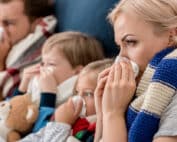Top 3 Anti Breast Cancer Supplements – You can eat, and drink clean and do your best to avoid chemicals, heavy metals and toxins, however they are present in the environment in large quantities and are everywhere. Certain substances are known as environmental endocrine disruptors or xenoestrogens because they affect your hormones. These xenoestrogens can cause reproductive disorders or cancer and are abundantly present in the environment. They are also known as Endocrine Disruptor Chemicals (EDC). This endocrine disruption is the most important cause of the well‑known hormone‑associate types of cancer and most Endocrine Disruptor Chemicals act on the estrogen receptor. 1
These Endocrine Disruptor Chemicals are released from products used in daily life and mimic or block naturally occurring hormones. They are thought to be the most important cause of hormone associated cancer such as breast or prostate cancer. 2
What Endocrine Disrupting Chemicals Do
- Increase cancer cell growth and decrease cancer cell death
- Toxic to DNA
- Suppress immune system
- Causes oxidative stress
- Induces chronic inflammation
Promising Supplements to Modulate EDC Activity
Sulforaphane
- Sulforaphane is found in cruciferous vegetables such as broccoli, cauliflower, kale, arugula, radishes, Brussels sprouts, Bok choy, collard greens and cabbage. It is one of the most widely studied compound that has potential to prevent cancer development, recurrence and metastases. 3 It has been shown to stop metastases because it inhibits cancer cells from migrating and invading other tissues. 4
Modified Citrus Pectin
- Citrus pectin is a soluble dietary fiber derived from the white pith of citrus fruit peels. It must be modified to be absorbed into the small intestine.5 Toxic metals such as arsenic and cadmium have estrogen line activity and have been linked to the development of tumors in the breast. Modified citrus pectin gets rid of these toxic metals in the urine especially arsenic and cadmium.6 Modified Citrus Pectin has been shown to decrease the resistance of cancer cells to chemotherapy, it helps with detoxification and improves immune function.55,7 It also antagonizes Galectin 3, which has been found to be increased in breast cancer and aids in the resistance of cancer cells to chemotherapy. 7
Curcumin
- Curcumin is an extract of turmeric, a spice that gives a bright yellow orange color to food. Studies show that it has antibacterial, anti-inflammatory, antioxidant and anticancer effects. It may inhibit tumor invasion and migration, enhance tumor cells death, modulates the microbiome in the gut which, if an imbalance of bad bacteria occurs called dysbiosis, it may lead to cancer development. 8,9
Some of the risk factors for developing breast cancer can’t be changed such as being a female, your age, a family history or breast cancer and your genetics. However, there are many things that influence the development of cancer that you can modify such smoking. alcohol use, being overweight and a sedentary lifestyle. A healthy diet focused on plant based foods, fruits, vegetables and healthy fats such as olive oil, nuts, avocado, fish high in Omega 3 and low in red meat and saturated fats can reduce the risk of breast cancer. Maintaining a normal weight, exercise, sleep and stress reduction can also decrease your risk.
While these supplements were not proven alone to treat breast cancer, they have plenty of health benefits and may be beneficial to reducing the risk of development, recurrence and metastases. There are other risk factors that need to be measured. Knowledge is power, have an evaluation by a functional medicine doctor to find out if you are at risk and how to reduce it. Apply for a free, no obligation consultation to see if we are a good fit.
References
- Calaf GM, Ponce-Cusi R, Aguayo F, Muñoz JP, Bleak TC. Endocrine disruptors from the environment affecting breast cancer. Oncol Lett. 2020;20(1):19-32. doi:10.3892/ol.2020.11566
- Bleak TC, Calaf GM. Breast and prostate glands affected by environmental substances. Oncol Rep. 2021;45(4):20. doi:10.3892/or.2021.7971
- Kuran D, Pogorzelska A, Wiktorska K. Breast Cancer Prevention-Is there a Future for Sulforaphane and Its Analogs? Nutrients. 2020;12(6):1559. doi:10.3390/nu12061559
- Zhang Y, Lu Q, Li N, Xu M, Miyamoto T, Liu J. Sulforaphane suppresses metastasis of triple-negative breast cancer cells by targeting the RAF/MEK/ERK pathway. NPJ Breast Cancer. 2022;8:40. doi:10.1038/s41523-022-00402-4
- Eliaz I, Raz A. Pleiotropic Effects of Modified Citrus Pectin. Nutrients. 2019;11(11):2619. doi:10.3390/nu11112619
- Eliaz I, Hotchkiss AT, Fishman ML, Rode D. The effect of modified citrus pectin on urinary excretion of toxic elements. Phytother Res. 2006;20(10):859-864. doi:10.1002/ptr.1953
- Dong R, Zhang M, Hu Q, et al. Galectin-3 as a novel biomarker for disease diagnosis and a target for therapy (Review). Int J Mol Med. 2018;41(2):599-614. doi:10.3892/ijmm.2017.3311
- Yang ZJ, Huang SY, Zhou DD, et al. Effects and Mechanisms of Curcumin for the Prevention and Management of Cancers: An Updated Review. Antioxidants (Basel). 2022;11(8):1481. doi:10.3390/antiox11081481
- Liu D, Chen Z. The Effect of Curcumin on Breast Cancer Cells. J Breast Cancer. 2013;16(2):133-137. doi:10.4048/jbc.2013.16.2.133





She is a recognized and award-winning holistic, functional, integrative and anti-aging healthcare practitioner, speaker and author, and has been featured in ABC News, Forbes, WOR Radio and many media outlets to spread the word that you can live younger and healthier at any age.